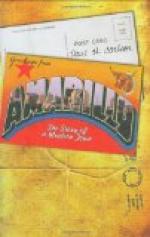“Well, sir, well, Mr. Lossing,” he remarked, clearing his throat, “I cannot express to you properly the— the appreciation I have of your—your princely gift!” (Harry changed a groan into a cough and tried to smile.) “I would like to ask you, however, how you would like it to be divided. There are a number of worthy causes: the furnishing of the church, which is in charge of the Ladies’ Aid Society; they are very hard workers, the ladies of our church. And there is the Altar Guild, which has the keeping of the altar in order. They are mostly young girls, and they used to wash my things—I mean the vestments” (blushing)—“but they—they were so young they were not careful, and my wife thought she had best wash the—vestments herself, but she allowed them to laundry the other—ah, things.” There was the same discursiveness in his talk as in his sermon, Harry thought; and the same uneasy restlessness of manner. “Then, we give to—various causes, and—and there is, also, my own salary ——”
“That is what it was intended for,” said Harry. “I hope the two hundred dollars will be of some use to you, and then, indirectly, it will help your church.”
Harry surprised a queer glance from the dean’s brown eyes; there was both humor and a something else that was solemn enough in it. The dean had believed that there was a mistake.
“All of it! To me!” cried Gilling.
“All of it. To you,” Harry replied, dryly. He was conscious of the dean’s gaze upon him. “I had a sudden impulse,” said he, “and I gave it; that is all.”
The tears rose to the clergyman’s eyes; he tried to wink them away, then he tried to brush them away with a quick rub of his fingers, then he sprang up and walked to the window, his back to Harry. Directly he was facing the young man again, and speaking.
“You must excuse me, Mr. Lossing; since my sickness a little thing upsets me.”
“Mr. Gilling had diphtheria last spring,” the dean struck in, “there was an epidemic of diphtheria, in Matin’s Junction; Mr. Gilling really saved the place; but his wife and he both contracted the disease, and his wife nearly died.”
Harry remembered some story that he had heard at the time— his eyes began to light up as they do when he is moved.
“Why, you are the man that made them disinfect their houses,” cried he, “and invented a little oven or something to steam mattresses and things. You are the man that nursed them and buried them when the undertaker died. You digged graves with your own hands— I say, I should like to shake hands with you!”
Gilling shook hands, submissively, but looking bewildered.
He cleared his throat. “Would you mind, Mr. Lossing, if I took up your time so far as to tell you what so overcame me?”
“I should be glad ——”
“You see, sir, my wife was the daughter of the Episcopal minister— I mean the rector, at the town—well, it wasn’t a town, it was two or three towns off in Shelby County where I had my circuit. You may be surprised, sir, to know that I was once a Methodist minister.”




